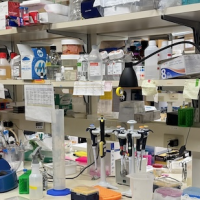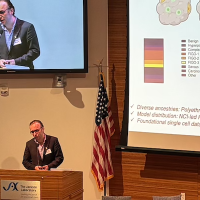
Endometriosis can have an effect on so many areas of your life. You may be concerned about your own fertility, with not only conceiving, but also having a healthy pregnancy and healthy baby. Because endometriosis does affect the reproductive system, you may have questions and concerns when it comes to pregnancy and whether or not you’re at a higher risk for miscarriage.
Read on to learn more about why miscarriages can happen because of endometriosis, your own risk factors, and how you can have the safest pregnancy possible.
Endometriosis and the risk for miscarriage
A 2016 study found that there could be up to a 77 percent increased risk of miscarriage with endometriosis for patients who already had a diagnosis of infertility, and a 67% increase in risk for those who did not have a diagnosis of infertility. That number sounds high, but don’t be alarmed. Most data evaluating risk of miscarriage in patients with endometriosis are retrospective in nature so it becomes harder to draw conclusions. More research needs to be done when it comes to figuring out why miscarriage rates may be increased for people with endometriosis. But let’s talk about miscarriage rates in general.
The majority of people who have endometriosis go on to have a healthy pregnancy. There are also many people who don’t have endometriosis and have miscarriages. Miscarriages are actually very common, despite the fact that many people, understandably, don’t talk about them.
According to the March of Dimes, about 10% to 15% of known pregnancies end in a loss. This means a person found out they were pregnant, usually by a blood or urine test at home or in a clinic, but then lost the pregnancy. What this statistic doesn’t count are all the other very early miscarriages that happen before a person even knows they’re pregnant. Up to 50% of pregnancies may be lost before taking a urine or blood pregnancy test, but unless you tested early, you may not even be aware it’s happened. The American College of Obstetricians and Gynecologists reports about 80 percent of miscarriages happen in the first trimester, or up to 13 weeks.
As miscarriages are already common in general, endometriosis can affect your body in certain ways that do carry a slightly higher risk than someone who doesn’t have the condition.
Dr. Alan Lindemann, obstetrician and maternal mortality expert, says that when it comes to miscarriage risk, endometriosis is still a mystery.
“[Endometriosis] certainly is one of the reasons it's hard to get pregnant. But it may also be one of the reasons it's hard to stay pregnant,” Dr. Lindemann explains.
Egg quality and miscarriage risk
Endometriosis itself usually isn’t the reason people tend to have more miscarriages. According to Dr. Michael Tahery a Board-Certified OB/GYN with subspecialty training in Urogynecology based in Los Angeles, it’s more so what endometriosis does to the quality of the egg as well as the endometrial lining. And it’s not entirely clear why this happens.
“No study has actually shown decisively what’s going on,” Dr. Tahery says, “They’ve looked at women who have fertility issues, with and without endometriosis. They found that women with fertility issues and endometriosis are at increased risk of miscarriage than women that have fertility issues, but no endometriosis. So that’s given us an idea that that causes problems for endometriosis.”
Endometriosis is associated with more complications in pregnancy. “There’s the risk of preterm labor, poor growth of the baby, abnormal placentation (which is when the placenta attaches deeper into the uterus than it should and/or invade through the uterus to the other organs), and an increased risk of cesarean sections,” Dr. Tahery explains. All of these may be the result of abnormal embryo implantation, not necessarily because of endometriosis. However, the presence of adenomyosis may directly contribute to issues with implantation, and thus issues with development of the placenta.
Bottom line: It’s not fully conclusive. A relationship between endometriosis and the formation of eggs and how that formation can affect the resulting embryo and how it grows has been demonstrated, but beyond egg and embryo quality alone, there may also be implantation issues.
Stages of endometriosis and your risk of miscarriage
If you had a more severe form of endometriosis, wouldn’t you think you would then have a higher risk of miscarriage compared to those who have milder forms? Not necessarily, says Dr. Tahery. While people with more severe endometriosis do have more trouble getting pregnant, it’s the more superficial, milder stages that are thought to most affect egg quality in a negative way.
This could be because more superficial lesions are associated with “a greater extent of inflammatory disorder,” which may lead to poor egg formation, decreased chances that those eggs can be fertilized with sperm, and the resulting embryo having a harder time implanting into the uterus, according to a 2017 study in the journal of Fertility and Sterility.
Risk factors that put you at increased risk for miscarriages
In addition to having mild or more moderate forms of endometriosis, Dr. Tahery says that untreated endometriosis itself can be an increased risk. For example, if you have endometriosis for years and no one knows about it, or you haven’t treated it. This is why it’s so important to address your endometriosis before getting pregnant.
But there aren’t any other unique risk factors for miscarriage in general. The risk factors for anyone are applied to those who have endometriosis. According to Dr. Lindemann these can include:
-
Smoking
-
Illicit drug use
-
Blood clotting disorders
-
Viral or bacterial infections
-
Obesity
-
Management of chronic diseases such as diabetes
-
Polycystic ovary disease
-
Uterine structural anomalies
What if you have endometriosis and want to get pregnant?
There are things you can do to help increase your chances of staying pregnant and having a healthy baby. While many people can conceive quickly on their own, sometimes it’s recommended to have some help getting pregnant such as doing intrauterine insemination, or in vitro fertilization (IVF) if you struggle to conceive within six months.
Do you need to do IVF?
IVF is a process where you would take hormone medications in order to stimulate your ovaries to produce a lot of eggs—more eggs than you would typically release in your monthly cycle. Those eggs are then surgically removed from your body and fertilized with sperm in a lab setting. Those fertilized eggs will hopefully grow into embryos over several days under the observation of embryologists. Those providers pick the best embryos, the ones with the most potential to give you a healthy pregnancy, and depending on your situation, one or more will be transferred back to your uterus to hopefully implant and grow to become a baby. How does endometriosis affect this process? Actually, the risk of a miscarriage goes down when you do IVF, even if you are experiencing fertility issues.
There have been studies on women who do IVF cycles and even with endometriosis, these women don’t appear to have an increased risk for miscarriage, according to Dr. Tahery. “With IVF cycles, endometriosis doesn’t seem to be a factor, because [doctors] select the good eggs and with all the hormonal stimulation, you have a higher number of good eggs that now the ovaries produce.”
Manage your symptoms
Treating and managing your endometriosis is a good idea even if you’re not ready to get pregnant, but plan to in the future. Treating the symptoms now and not waiting until they get worse will help you be at your healthiest for a future pregnancy.
Managing endometriosis pain with birth control pills, for instance, not only could help make the quality of your life in general better, but you could also reduce how much the endometriosis is progressing, says Dr. Lindemann.
Consider surgery for treatment
Surgery is another option to decrease your chances of a miscarriage in the future. According to Dr. Tahery, endometriosis experts are divided on how to best treat endometriosis symptoms. Some believe surgery is the only way to diagnose and treat endometriosis. Others think surgery is beneficial but also believe in using hormones to suppress endometriosis.
“I believe the best thing is a combination [of the two]. Both surgical when necessary and hormonal suppression if somebody has classic symptoms,” explains Dr. Tahery.
Find a doctor knowledgeable in endometriosis
If you’re planning on doing IVF or another type of fertility treatment to try to get pregnant, you’ll definitely need to see a doctor that has special training in fertility issues. But according to Dr. Lindemann, it is a good idea to get a referral to a specialist if you’re having trouble getting pregnant in general when you have endometriosis. Because endometriosis has the potential to affect pregnancy, finding a specialist in endometriosis will not only help your pregnancy, but also help you ensure the best kind of endometriosis care.
“If you have an OB,” says Dr. Lindemann, “doing a cycle or two of Clomid wouldn't hurt anything, but I don't think I’d spend six months in not getting pregnant.” For people who don’t have any conditions that might affect pregnancy, it’s usually recommended to wait a year. But with conditions including endometriosis, you should see a specialist if you haven’t gotten pregnant on your own after six months.
Finding out you’re pregnant can give you a range of feelings from joy to fear to anxiety. No matter how much you try, the anxiety can still be there, but it’s important to know that there is a lot that’s out of your control when it comes to pregnancy in general.
But treating and managing your endometriosis as much as possible, and caring for your body in order to have a healthy pregnancy, is the best you can do for yourself and for your future children.









